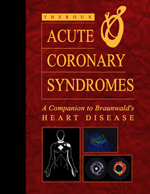|
|
|
| |
 |
|
|

|
 推薦指數:
推薦指數:





|
|
- 內容介紹
|
Acute Coronary Syndrome
Pierre Theroux MD, Montreal Heart Institute, Montreal, Canada
ISBN 0721696139 · Hardback · 648 Pages · 527 Illustrations
Saunders · Title (July 2003)
This book provides a background of the fundamentals of basic science related to acute coronary syndrome in combination with extensive sections on diagnosis and treatment management. The frequency of ACS is on the rise worldwide, and this timely book covers management through pharmacologic therapy and revascularization. The section on pharmacologic agents includes contributions from the world leaders in cardiovascular drug therapy. Coverage of the recent guidelines for acute coronary syndrome management is included with commentary from the Eugene Braunwald. Included in the Companion series to Braunwald's Heart Disease, this book covers the most challenging cardiovascular problem today.
Contents
Table of Contents
I. ACS and Clinical Practice
1. From Pre-Infarction Angina to Acute Coronary Syndromes: The History of Unstable Angina
2. The Dimension of the Problem, National and International Statistics, The Cost for the Society
3. An Epidemiological Perspective; Society, Environment, Risk Factors, and Genetic
4. Natural History and Prognosis in Unstable Angina
5. Organization and Structure of the Coronary Care Units in the Years 2000
II. Pathophysiology
6. Pathology of Acute and Stable Coronary Syndromes
7. Molecular Mechanisms of the Acute Coronary Syndromes: The Roles of Inflammation and Immunity
8. Endothelial Function and Acute Coronary Syndromes
9. Infection
10. Triggers to Acute Coronary Syndromes
11. Novel Risk Factors for ACS
12. What Cardiologists Need to Know about Depression
III. Diagnosis
13. Clinical Recognition of Acute Coronary Syndromes
14. The Role of ECG, ECG Monitoring and Provocative Stress Testing in Acute Coronary Syndromes
15. Biochemical Markers of Myocardial Necrosis
16. Markers of a Thrombotic State
17. Markers of Inflammation
18. Angiographic Characterization of the Culprit Lesion in ACS
19. Nuclear Cardiology in Acute Coronary Syndromes
20. Echocardiography in Acute Coronary Syndromes
21. Cardiac Magnetic Resonance
22. Computed Tomography for Acute Coronary Syndromes
23. Emerging Diagnostic Procedures for Vulnerable Plaque
24. ACS in the Emergency Department: Diagnosis, Risk Stratification and Management
25. ACS in the CCU
26. Risk Stratification in Unstable Angina/Non-ST Elevation Myocardial Infarction
IV. Special Subgroups
27. The Elderly, Woman and Patient with Diabetes
28. Coronary Artery Spasm
29. Cocaine and Other Environmental Causes of Acute Coronary Syndromes
30. The Patient with Chest Pain Despite Normal Coronary Angiography
31. The Patient with Disabling Angina Not Amenable to Revascularization (ECP, TMR, IABC, PMR, spinal chord stimulation)
V. Pharmacologic Management
32. Nitrates and Nitric Oxide Donors
33. Beta-blockers and Calcium Channel Blockers (CCBs): Use in Acute Coronary Syndromes 34. ATP-sensitive Potassium Channels, Adenosine and Preconditioning
34. ATP-sensitive potassium channels, adenosine Preconditioning
35. Metabolic Interventions
36. Antiplatelet Therapy
. Aspirin
. The Combination Aspirin-Clopidogrel
. Other ADP Antagonists
. The GPIIb/IIIa Antagonists
. New Antiplatelet Agents
37. Anticoagulants in Acute Coronary Syndromes
38. Anti-thrombotic Management
39. Treatment of Cardiovascular Inflammation
40. Acute Plaque Passivation and Endothelial Therapy
41. Perspective for Gene Therapy
42. Myocardial cell protection
VI. Revascularization
43. Revascularization in Acute Coronary Syndromes: Which Patients and When?
44. Advantages and Hazard of Early Revascularization
45. New Revascularization Procedures, Surgical and Percutaneous
46. Cardiovascular Regeneration and Stem Cell Differentiation in Myocardial Ischemia
47. Pharmacological Revascularization
VII. From the Acute to the Chronic Phase
48. Control of Risk Factors
49. Dietary Intervention in the Coronary Care Units and in Secondary Prevention
VIII. Outlook to the Future
50. ACS: Outlook to the Future
IX. Guidelines for Management
51. Guidelines for Management: AHA/ACC and ESC Task Forces
|
|
|

